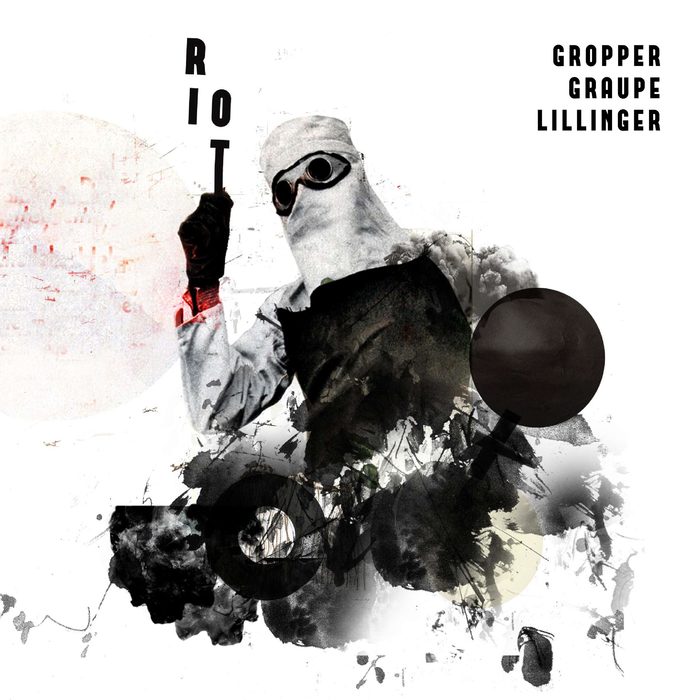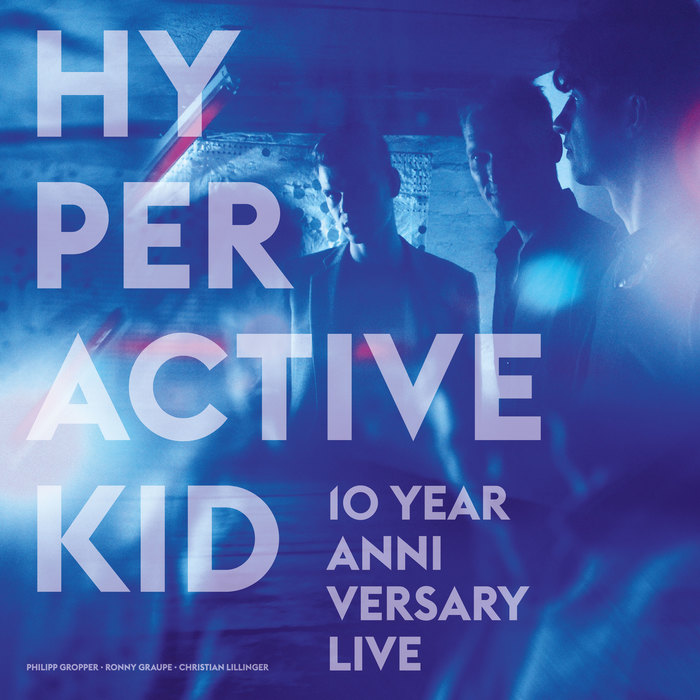Riot von Gropper/Graupe/Lillinger
2016 WhyPlayJazz (RS030), CD + MP3 Album Download

Titelverzeichnis
Besetzung
Philipp Gropper (tenor saxophone), Ronny Graupe (guitar), Christian Lillinger (drums)
Produktionsdetails
Recorded (August 2015) and mixed (April 2016) at rbb-Studio Berlin by Maria Suschke (Sound Supervisor), Peter Schladebach (Sound Engineer) and Ulrich Hieber (Digital Cut). Mastered by Ulrich Hieber and Klaus Scheuermann. Produced for Kulturradio rbb by Ulf Drechsel. Photo by Ludwig Ohla. Artwork by Travassos. Special thanks to Kulturradio rbb, Maria Suschke, Ulrich Hieber, Peter Schladebach, Ulf Drechsel, Roland Schulz, Travassos, Klaus Scheuermann and Ludwig Ohla.
Sie treten nicht auf, sie steigen in den Ring. Jeder als Impulsgeber eines musikalischen Clinchs, der hellwach die sich entwickelnden Ereignisse existenziell werden lässt. Aufruhr, Tumult und Revolte – darum RIOT. Plastic flow Baby!
Sie treten nicht auf, sie steigen in den Ring. Face to face begegnen sie sich dort. Jeder für sich, jeder für den anderen, jeder hoch konzentriert und aufnahmebereit für die blitzschnell produzierten Ideen, jeder als Impulsgeber eines musikalischen Clinchs, der zwischen Ruhephasen und Attacke hellwach die sich entwickelnden Ereignisse existenziell werden lässt. GROPPER/GRAUPE/LILLINGER ist nicht einfach nur eine Band, GROPPER/GRAUPE/LILLINGER ist ein pumpender, atmender, vitaler Organismus. Ein Organismus, dessen Eigenleben sich im nun schon 14. Jahr seines Existierens wie ein unverhoffter Glücksfall auf das Publikum überträgt. Es passiert unmittelbar, weil diese simultanen, kollaborativen, ebenso freien wie disziplinierten Klanggespinste einen Nerv treffen und aus vorbeschrifteten Schubladen springen. Immanente Voraussetzung ist die inhaltliche Auseinandersetzung mit dem, was da ist: Spielarten von Jazz, Neuer Musik, Elektronik, Noise, progressivem Rock… Saxofonist Philipp Gropper, Gitarrist Ronny Graupe und Schlagzeuger Christian Lillinger haben jedoch die Elemente nicht verinnerlicht, um sie zu reproduzieren, sondern um daraus ihres zu destillieren. All die Wurzeln werden daraufhin befragt, warum sie einmal solche Dringlichkeit entwickeln konnten, um dann in eine Gegenwart gezoomt zu werden, wo sie sich dem Spirit des Jetzt zuordnen. Sehr formbewusst, individuell statt als Reproduktion, fiebrig statt linear, frei, dynamisch und konspirativ spiegeln die drei trialogisch die Metropolen der Gegenwart, setzen sich ihnen aus und bewegen sich Haken schlagend durch ihre Labyrinthe. Wieder und immer mehr ist ihre Haltung dabei keine defensive. Darum RIOT, darum Aufruhr, Tumult und Revolte. Musik von unbedingter Relevanz entsteht so, die sich immer mehr ihrer über weite Strecken auskomponierten Mittel bewusst ist. Nach den letzten Livealben nutzt die Band auch die Studiomöglichkeiten von Nachbearbeitung und Soundverfremdung, installieren diesmal Interludien als kleine Ruheinseln in die Bewusstseinsströme ihrer urbanen Expeditionen und geben zum Glück kein bisschen Ruhe in ihren immer noch zupackenden gemeinsamen Ankünften und Aufbrüchen. Je länger, je lieber…
Reviews
Auf diese Weise stellen Gropper und Graupe Lillingers agiler Perkussivität eine laute und doch ruhig kreisende, fast hypnotische Kraft gegenüber - so lange, bis sie zum tatsächlich endgültigen Höhepunkt selbst immer bewegter spielen und am Ende solistisch virtuos zu Lillinger aufschließen.
Se dunque l'atteggiamento delle avanguardie germaniche non si è mai fatto troppo attendere per apporto polemico e forti prese di posizione, su tale grande filone converge con titolate istanze di protagonismo il giovane ma già ben sperimentato trio, e dal comune, rivoltoso (e, perché no, "riottoso") sound si genera un dinamico coacervo di tattiche istantanee funzionali a tale strategia di cruda denuncia e coerente partecipazione.
Three-legged stools are only able to stand upright because of the weight is balanced equally in thirds. Remove one prop and the entire structure can collapse. […] Riot is a matchless display of Extrasensory perception-like tightness. […] One instrument takes the lead as if it is an adult shepherding children, while the other two act up like rival siblings, advancing attention-getting stratagem; then roles are shifted. Variants of this strategy work throughout the CD, reaching its zenith in the final and title tune. More variegated in execution, by that point individual output is simultaneously coagulated and loosened. […] With sequences decorated, deconstructed and explored singly or in tandem, the program becomes more cohesive. Unlike three lines improvised in broken chords, all the output affiliates into a solid statement.
Their new release, Riot, is a texture rich album rife with exploratory electronic sounds, abstract rhythms, wrapped in the musical ease that a long time association can bring. […] Once awake, the group stretches out its arms and embraces the new day. A great listen!
Not a kid anymore? [...] Nervös-urbane Improvisationsmusik mit einer spürbaren Abneigung gegen Langeweile. […] – und „Riot“ klingt so, wie man sich politische Instrumentalmusik in unruhigen Zeiten vorstellt oder wünscht. Durchtrainiert und kompromisslos...
Gropper/Graupe/Lillinger präsentieren sich auf ihrem neuen Studioalbum als Impulsgeber eines musikalischen Zustands, der der eigenen Beschreibung als „pumpender, atmender, vitaler Organismus“, überraschend nahekommt, „Darum RIOT, darum Aufruhr, Tumult und Revolte.“
Auch auf seiner sechsten CD, die statt Standards Eigenkompositionen bietet, ist das Trio innovativ geblieben mit komplexen Kompositionen zwischen Jazz, Neuer Musik, Rock und - erstmals - Elektronik. Die verschiedenen Einflüsse werden geschickt verquickt, sind nie stromlinienförmig. Im Gegenteil. In dicht verzahntem Zusammenspiel klingt das Ganze recht sperrig und aufrührerisch. "Riot" ist folglich der Titel des Albums.
Ihre Ästhetik bleibt radikal: Es gibt wohl keine improvisierende Band in Deutschland, die zugleich eine so komplexe und kompromisslose komponierte Musik spielt.
Das Schöne ist, dass der Berliner Top-Gitarrist und -Komponist Ronny Graupe jetzt mit gleich zwei neuen CDs vertreten ist und sich alles, was musikalisch so rätselhaft, so far out, so rebellisch an ihm scheinen mag, in Wohlgefallen auflöst, weil beide in der Summe deutlich machen, was ihn antreibt: die freie Improvisation, provokant abstrahierend in "Gropper/Graupe/Lillinger" oder als konsequente Fortführung dessen, was Improvisation im modernen Jazz bedeuten kann, in "Ronny Graupes Spot“. Ronny, hats off!
Der Saxofonist Philipp Gropper formuliert mit Graupe und Lillinger auf „Riot“ (WhyPlayJazz/Greifswald) eine Musik, deren radikale Klangästhetik bereits im Albumtitel zum Ausdruck kommt.
Dieses liegt zwischen brodelndem, freiem Jazz voller ungestümer Dringlichkeit und experimentellem Rock: 43 Minuten Achterbahnfahrt, stets haarscharf an der Kante entlang und immer auch da, wo‘s herausfordert.
Monotones Schönklangvermeidungsritual aus der Mottenkiste des uralten Free Jazz der sechziger Jahre.
Geblieben ist die bassfreie Quecksilbrigkeit, das Vertauschen der Rollen untereinander. Und die Unruhe.
This is no ordinary music...this is not for mere contemplation of philosophical calm or zen utopia, for shaking your rump to a groove or swaying gently in melodic celebration...this is music for causing an uneasy tension, for setting displeasure at the start of every utterance. Well done fellas, dat's fresh.
Er auf der Bühne: ein Naturereignis, ein Tonvulkan, ein Instrumentalist, den man nicht vergisst. Gefährlich, wendig, lässig, rockig. Virtuos bis zum Anschlag, aber ohne all diese Testosterondoofheit, die einem viele Gitarristen so verleidet. Man muss ja nicht nur gut spielen können, man muss ja auch wissen, was man besser nicht spielt. Ronny Graupe heißt Jazz-Deutschlands neuer Supergitarrist, und er macht sich einen Spaß aus der immer noch anzutreffenden Nachfrage: Ronny wer?
Schroffe, kantige und sperrige Improvisationsmusik.
Charme der Zappelbude wird zum Aufruhr: “Hyperactive Kid“ mit neuem Namen auf dem Jazzfestival Frankfurt
Unorthodoxe jähe Motivkürzel, eine sardonische Knappheit, das vitale perkussive Detail und das Spiel mit der Lücke. Die Musik des Berliner Trios, zeichnet sich durch eine forcierte Dringlichkeit aus. Das hat Format, rundum.
You can always count on this trio challenging, fresh attitude.
The trio decided to drop the Hyperactive Kid moniker and open a new chapter of their creative path, with an immediate result of going even further away from the conventional musical world into extreme avant-garde, which completely beats classification. [...] Every listener can define the thin line between freedom and havoc here individually, as the music obviously refuses to set any boundaries itself.
Mit dem neuen Namen solle der Vielfalt und Ernsthaftigkeit ihrer Musik nichts mehr im Wege stehen, so die Bandmitglieder.
"Gropper/Graupe/Lillinger" formerly known as "Hyperactive Kid" – ihre Musik ist wie Quecksilber, in permanenter Bewegung, sprudelt voller Ideen. "Riot" ist das erste richtig "produzierte" Album.
Plastic flow baby! Es wäre mir ein Leichtes, nur die rhythmischen Aspekte hervorzuheben, welche die musikalischen Erkundigungen von Hyperactive Kids ausmachen. Dabei würde glatt das Entscheidende übersehen werden. Denn genau so tragen intervallische Bestandteile zu ihren kühnen nicht-linearen Strukturen bei.
Die Auseinandersetzung mit der Innenwelt scheint eine weitere wichtige Angelegenheit der drei Improvisatoren zu sein. Spiegelt sich doch in ihrer Musik ein abstraktes Bild eines Alltages unserer modernen europäischen Gesellschaft wieder. Die kraftvolle Energie, die aus Hyperactive Kids Improvisationen und Kompositionen geradezu herausschreit, ist sehr direkt, real und absolut menschlich.
Wir sprechen hier von drei ineinander verflochtenen Individuen, die sich mit sichtbar gegensätzlichen Charakteren eine vielschichtige Perspektive erschaffen. Plastic Flow Baby.
